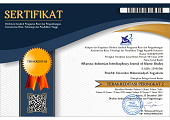The Da'i (Muslim Preachers) and Social Change Challenges: a Study of Da'i Professionalism in Dumai, Riau
Abstract
This article examines the preacher's professionalism in the dynamics of social change in the Dumai Muballigh (Muslim Preacher)Association (PMD). The development of information technology is one of the causes of social changes that occur and currently shows the complexity of the problems faced by the people and preachers. Da'wah as a call, invitation, and appeal is expected to be transformed to be relevant to any changes that occur. This requires professional preachers to be able to become agents of change. In preaching, the development of preaching resources is emphasized on various aspects such as material, mental, skills, knowledge, and psychic. The results showed that the effort to create professional preachers in the PMD is doing human resource development through muzakarah and preaching guidance to strengthen science and skills, training and use of IT (Information Technology) as a form of transformation, conducting preaching certification as an effort to assess and qualify the quality of preachers' abilities, improving education levels through further education cooperation agreements among preachers and companies, universities and government, and the development of contemporary preaching material through the study of books, and hadith.
Keywords
Full Text:
PDFReferences
Aliyudin, Aliyudin. “Prinsip-prinsip Metode Dakwah menurut Al-Qur’an.” Ilmu Dakwah: Academic Journal for Homiletic Studies 5, no. 15 (2010): 1007–22. https://doi.org/10.15575/idajhs.v5i15.431.
Annur, Saipul. “Respon Masyarakat Terhadap Sertifikasi Ulama Di Kota Palembang.” Medina-Te : Jurnal Studi Islam 18, no. 1 (16 Juli 2018): 102–20.
Arsam, Arsam. “Persepsi Para Mubaligh Terhadap Wacana Kontroversi Standardisasi Khatib Dan Sertifikasi Mubaligh.” Komunika: Jurnal Dakwah Dan Komunikasi 11, no. 2 (2017): 235–49. https://doi.org/10.24090/komunika.v11i2.1367.
Budiantoro, Wahyu. “Urgensi Manajemen Dalam Pengembangan Aktivitas Dakwah.” Komunika: Jurnal Dakwah dan Komunikasi 10, no. 2 (2016): 278–91. https://doi.org/10.24090/komunika.v10i2.949.
Fahrurrozi, Fahrurrozi. “Sertifikasi atau Standarisasi Khatib? Respons Para Da’i di Kota Mataram.” Jurnal Komunikasi Islam 8, no. 1 (1 Oktober 2018): 155–78. https://doi.org/10.15642/jki.2018.1.1.155-178.
Fuadiyah, Ainiatul. “Manajemen Pelatihan Khitobah Dalam Meningkatkan Kemampuan Santri Menjadi Muballigh Profesional Di Pondok Pesantren Salaf Tahfidz Al-Qur’an Al Arifiyyah Pekalongan.” Undergraduate, UIN Walisongo, 2015. http://eprints.walisongo.ac.id/4764/.
Kholili, H. M. Kholili H. M. “Pondok Pesantren Dan Pengembangan Potensi Dakwah.” Jurnal Dakwah 13, no. 2 (2012): 177–202. https://doi.org/10.14421/jd.2012.%x.
Kriyantono, Rachmat, Teknik Praktis Riset Komunikasi, Jakarta: Kencana, 2014.
Madani, Abu Bakar. “Dakwah Dan Perubahan Sosial: Studi Terhadap Peran Manusia Sebagai Khalifah Di Muka Bumi.” Lentera 1, no. 01 (18 Mei 2017). https://doi.org/10.21093/lentera.v1i01.851.
Marhen, Marhen. “Persiapan Mubaligh Dalam Mengemas Materi Tabligh.” Alfuad: Jurnal Sosial Keagamaan 2, no. 1 (15 November 2018): 65–79. https://doi.org/10.31958/alfuad.v2i1.1210.
Moleong, Lexy J., Metode Penelitian Kualitatif, Bandung: PT. Remaja Rosdakarya, 2000.
Nurfuadi, Nurfuadi. “Reaktualisasi Profesi Dakwah.” Komunika: Jurnal Dakwah dan Komunikasi 2, no. 1 (2008): 54–72. https://doi.org/10.24090/komunika.v2i1.810.
Perdamaian, Perdamaian, Kodarni Kodarni, dan Dony Arung Triantoro. “Strategi Dakwah Berbasis Media Elektronik Di Persatuan Mubaligh Dumai (PMD) Kota Dumai.” Idarotuna 1, no. 1 (9 Oktober 2018). http://ejournal.uin-suska.ac.id/index.php/idarotuna/article/view/6071.
Prasanti, Ditha. “Perubahan Media Komunikasi Dalam Pola Komunikasi Keluarga Di Era Digital.” Commed : Jurnal Komunikasi Dan Media 1, no. 1 (17 Juli 2017): 69–81.
Risdiana, Aris. “Transformasi Peran Da’i Dalam Menjawab Peluang dan Tantangan (Studi terhadap Manajemen SDM).” Jurnal Dakwah 15, no. 2 (2014): 433–51. https://doi.org/10.14421/jd.2014.%x.
Rubawati, Efa. “Media Baru: Tantangan dan Peluang Dakwah.” Jurnal Studi Komunikasi 2, no. 1 (1 Maret 2018). https://doi.org/10.25139/jsk.v2i1.586.
Setiawan, Asep Iwan. “Dakwah Berbasis Pemberdayaan Ekonomi dan Peningkatan Kesejahteraan Mad’u.” Ilmu Dakwah: Academic Journal for Homiletic Studies 6, no. 2 (2012): 347–262. https://doi.org/10.15575/idajhs.v6i2.342.
Shodiqin, Asep. “Reposisi Muballigh: Dari ‘Personal’ Menuju ‘Agent of Change.’” Ilmu Dakwah: Academic Journal for Homiletic Studies 6, no. 2 (2012): 363–82. https://doi.org/10.15575/idajhs.v6i2.343.
Stiawan, Eko. “Strategi Muhadharah Sebagai Metode Pelatihan Dakwah Bagi Kader Da’i Di Pesantren Daarul Fikri Malang.” Fenomena 14, no. 2 (23 Maret 2016). http://ejournal.iain-jember.ac.id/index.php/fenomena/article/view/210.
Widodo, Pulla Pandika, dan Elisawati Elisawati. “Penjadwalan Mubaligh Online Pada Persatuan Mubaligh Dumai (PMD) Kota Dumai.” I N F O R M A T I K A 9, no. 2 (10 Januari 2019): 25–32.
republika.co.id, 26 Juli 2018.
tribunnews.com/nasional 6 September 2018.
cnnindonesia.com/nasional 3 September 2018.
https://kbbi.web.id/profesional, 2019.
https://www.pelajaran.id/2017/14/pengertian-profesionalitas-menurut-para-ahli.html.
https://www.merdeka.com., 23 Mei 2018.
https://www.merdeka.com, 22 Mei 2018
UU No. 16 Tahun 1999 diakses melalui www.bpkp.go.id tanggal 6 September 2019
DOI: https://doi.org/10.18196/AIIJIS.2020.0113.58-81
Refbacks
- There are currently no refbacks.
Copyright (c) 2020 Afkaruna: Indonesian Interdisciplinary Journal of Islamic Studies

This work is licensed under a Creative Commons Attribution-ShareAlike 4.0 International License.
Afkaruna: Indonesian Interdiciplinary Journal of Islamic Studies indexed by:












1.png)


